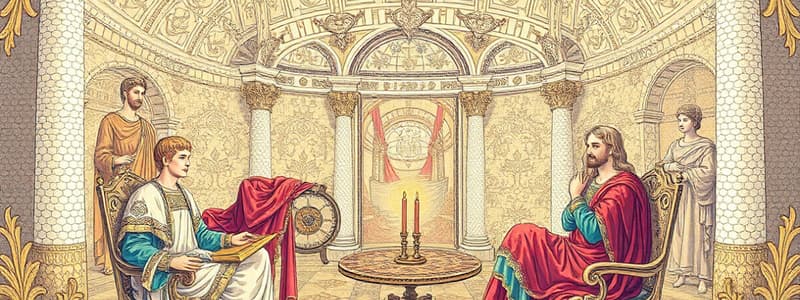Podcast
Questions and Answers
What was the highest elected political office in ancient Rome?
What was the highest elected political office in ancient Rome?
- Praetor
- Consul (correct)
- Tribune of the Plebs
- Aedile
The quaestor was responsible for public works and festivals.
The quaestor was responsible for public works and festivals.
False (B)
What office had the power to veto decisions made by the patrician class?
What office had the power to veto decisions made by the patrician class?
Tribune of the Plebs
The sequential order of public offices in ancient Rome is known in Latin as the ______.
The sequential order of public offices in ancient Rome is known in Latin as the ______.
Match the following offices with their responsibilities:
Match the following offices with their responsibilities:
Which of the following was the last step before the consulship?
Which of the following was the last step before the consulship?
There were no age requirements for the cursus honorum.
There were no age requirements for the cursus honorum.
What was a common challenge candidates faced when pursuing political offices in ancient Rome?
What was a common challenge candidates faced when pursuing political offices in ancient Rome?
Successful completion of the cursus honorum established credibility and ______ in Roman society.
Successful completion of the cursus honorum established credibility and ______ in Roman society.
Which office typically had membership based on previous offices held and experience in government?
Which office typically had membership based on previous offices held and experience in government?
Which of the following best describes the political role of a praetor?
Which of the following best describes the political role of a praetor?
Candidates for public office had to rely solely on their wealth to gain support.
Candidates for public office had to rely solely on their wealth to gain support.
What was the primary electoral body that conducted major elections in Republican Rome?
What was the primary electoral body that conducted major elections in Republican Rome?
The consulship was the highest elected office in the Roman cursus honorum, usually held by two individuals serving for a term of ___________.
The consulship was the highest elected office in the Roman cursus honorum, usually held by two individuals serving for a term of ___________.
Match the following political offices with their primary responsibilities:
Match the following political offices with their primary responsibilities:
What role did patron-client relationships play in the electoral process?
What role did patron-client relationships play in the electoral process?
Wealth was the only requirement for holding public office in Republican Rome.
Wealth was the only requirement for holding public office in Republican Rome.
What term is used to describe families who had members that held high offices in the Senate?
What term is used to describe families who had members that held high offices in the Senate?
Aediles were responsible for public works, games, and the __________ supply.
Aediles were responsible for public works, games, and the __________ supply.
Which of the following offices was not part of the traditional cursus honorum sequence?
Which of the following offices was not part of the traditional cursus honorum sequence?
Flashcards
Cursus Honorum
Cursus Honorum
The sequential order of public offices held by aspiring politicians in ancient Rome.
Consul
Consul
Highest elected political office in the Roman Republic, held by two individuals for a one-year term.
Praetor
Praetor
Roman magistrate responsible for judicial matters and assisting consuls.
Aedile
Aedile
Signup and view all the flashcards
Quaestor
Quaestor
Signup and view all the flashcards
Tribune of the Plebs
Tribune of the Plebs
Signup and view all the flashcards
Senator
Senator
Signup and view all the flashcards
Minimum age requirement
Minimum age requirement
Signup and view all the flashcards
Political ambition
Political ambition
Signup and view all the flashcards
Electoral Competitions
Electoral Competitions
Signup and view all the flashcards
Patron-Client relationships
Patron-Client relationships
Signup and view all the flashcards
Comitia centuriata
Comitia centuriata
Signup and view all the flashcards
Comitia tributa
Comitia tributa
Signup and view all the flashcards
Political influence
Political influence
Signup and view all the flashcards
Roman Republic
Roman Republic
Signup and view all the flashcards
Political ladder
Political ladder
Signup and view all the flashcards
Public works
Public works
Signup and view all the flashcards
Food supply
Food supply
Signup and view all the flashcards
Censors
Censors
Signup and view all the flashcards
Dictator
Dictator
Signup and view all the flashcards
Nobiles
Nobiles
Signup and view all the flashcards
Social status
Social status
Signup and view all the flashcards
Patricians
Patricians
Signup and view all the flashcards
Plebeians
Plebeians
Signup and view all the flashcards
Study Notes
Cursus Honorum in Republican Rome
-
Definition: The cursus honorum was the sequential order of public offices held by aspiring politicians in ancient Rome.
-
Components:
- Consul:
- Highest elected political office.
- Typically held by two individuals jointly for a one-year term.
- Praetor:
- Assumed judicial responsibilities.
- Assisted consuls in military and civil matters.
- Served as a stepping stone to the consulship.
- Aedile:
- Responsible for public works, games, and the maintenance of temples.
- Required to oversee the grain supply and public festivals.
- Quaesor:
- Handled financial affairs and treasury.
- Often served as an aide to higher officials.
- Consul:
-
Lower Offices:
- Tribune of the Plebs:
- Elected to represent the plebeians.
- Had the power to veto decisions made by the patrician class.
- Senator:
- Membership typically based on previous offices.
- Served as advisory and legislative role.
- Tribune of the Plebs:
-
Age and Sequence:
- There were minimum age requirements for each office.
- The cursus honorum was typically followed in a prescribed sequence, although variations existed based on political ambition and circumstances.
-
Political Influence:
- Successful completion of the cursus honorum established credibility and status.
- It was often essential for gaining political power and influence in Roman society.
-
Electoral Challenges:
- Candidates frequently faced stiff competition and needed popular support.
- Corruption and patronage networks were common.
-
Legacy:
- The cursus honorum influenced political structures in later Roman governance.
- It established a framework that defined political careers in the Republic era.
Cursus Honorum
- The cursus honorum was the sequential order of public offices held by aspiring politicians in ancient Rome.
- The sequence included holding positions in the following order: Quaestor, Aedile, Praetor, Consul, and Senator.
- The cursus honorum was a critical pathway for climbing the political ladder in the Roman Republic.
- Holding each office in the sequence was essential for gaining the experience, credibility, and influence needed to advance to higher positions.
- The cursus honorum established a defined structure for political careers, ensuring order and stability in the Republic.
- The order of offices was adhered to by many Roman politicians, but flexibility existed based on individual political ambitions and circumstances.
- Minimum age requirements were set for each office, ensuring that politicians had sufficient experience before assuming higher positions.
- The cursus honorum helped ensure that individuals gained the experience and knowledge necessary to lead the Roman Republic.
- The cursus honorum emphasized the importance of public service and shaped political culture in Roman society.
- The process was marked by competition and patronage networks, which reflect the political realities of the Roman Republic.
- The cursus honorum was a crucial element of the Roman Republic's political system. It was a product of Roman society that shaped its history
- Despite variations and challenges, the cursus honorum remained an influential framework for political careers during the Roman Republic.
Consul
- Highest elected political position in the Roman Republic.
- Two Consuls were elected annually, sharing responsibility for the Republic.
- Consuls exercised substantial power, including military command and overseeing civil administration.
- The Consulship was the pinnacle of ambition for many Roman politicians.
Praetor
- Held judicial responsibilities, including presiding over legal cases.
- Acted as assistants to the Consuls during wartime or periods of civil unrest.
- Served as a pre-requisite to the Consulship, providing practical political experience.
Aedile
- Responsible for public works, such as roads, temples, and infrastructure.
- Overseeing the grain supply and public festivals.
- Providing essential public services and maintaining order in Roman society.
Quaestor
- Dealt with the management of finances and treasury.
- Supported and assisted higher-ranking officials.
- Provided the foundational administrative skills necessary for higher-ranking positions.
Tribune of the Plebs
- Represented the interests of the plebeian class, or common people.
- Held the power to veto decisions made by the patrician class, or elite.
- Advocated for the rights of the plebeians and championed their interests.
Senator
- Membership gained through holding prior political offices and serving as advisors.
- Served as a legislative body, shaping the direction of the Republic.
- Reflected the experience and influence of individuals who had served the state.
Cursus Honorum in Republican Rome
- The cursus honorum was a sequential order of public offices held by aspiring politicians in Roman Republic.
- The Roman Government was an elected republic.
- The cursus honorum was a path to political power.
- It was a system where ambitious Romans climbed a ladder of public offices.
- The offices were held in a specific order, with each providing experience and qualifications for the next.
- Electoral processes involved comitia centuriata and comitia tributa.
- These were assemblies where citizens voted for their representatives.
- Political campaigns involved speeches, public works, and alliances with influential figures.
- Elected officials relied upon patron-client relationships for support.
- These relationships provided resources and political favors in exchange for loyalty and votes.
Political Offices in the Cursus Honorum
- Quaestor was the first office in the cursus honorum.
- It involved managing finances, often in a province or with a general.
- Aedile was responsible for public works, games, and food supply.
- It was an optional office that could boost popularity.
- Praetor was a judicial role that could also involve leading armies.
- Most praetors served in provinces.
- Consul was the highest elected office, with two consuls serving one-year terms.
- They commanded the army and presided over the Senate.
- Censor was appointed to conduct the census, oversee morals, and manage the Senate.
- It wasn't strictly part of the traditional sequence.
- Dictator was a temporary emergency office, appointed in times of crisis.
- It lasted for a maximum of six months.
Social Status and the Cursus Honorum
- The cursus honorum was dominated by the patricians and upper-class plebeians.
- It required significant wealth and political connections.
- Candidates needed a certain level of ancestry or political lineage to be considered acceptable.
- Political power was intertwined with social status.
- The elite classes often maintained control of the highest offices.
- Public office provided social prestige and increased wealth.
- Connections and influence granted through office-holding provided benefits.
Senatorial Hierarchy and Influence
- The Senate, made up of former magistrates, had significant power and influence.
- "Nobiles" were families with members who had held high office.
- They held privileged positions within the Senate.
- Senatorial rank was determined by the office held and seniority.
- Political alliances and rivalries among senators shaped the decisions and policies of the Republic.
Studying That Suits You
Use AI to generate personalized quizzes and flashcards to suit your learning preferences.




